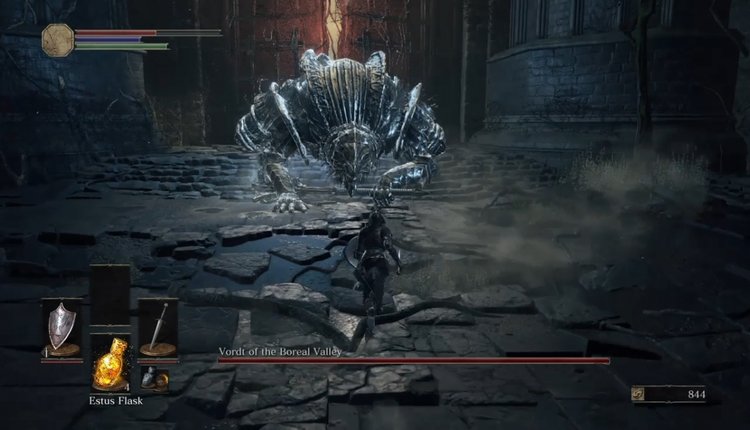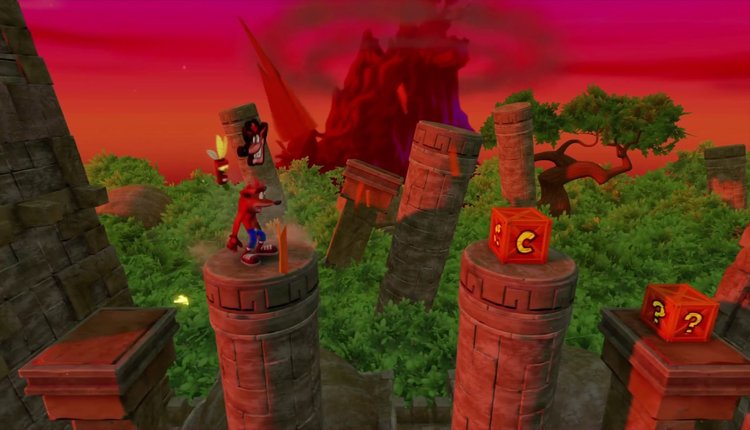Why are Cuphead and Crash the new Dark Souls?
It’s a strange world in which a game where you play an anthropomorphic cup fighting psychic carrots and genies who summon floating pyramids that shoot lasers gets compared to many things, least of all a game centered around a post-apocalyptic dark fantasy where you play an undead abomination, but it would seem that’s the world we live in. This comparison, between the newly released and latest indie darling Cuphead and the firmly established Dark Souls series, is reflective of a somewhat odd trend that has emerged this year, starting, funnily enough, with another light-hearted, comedic game being compared to the incredibly grim and depressing Dark Souls, in this case, the remastered Crash Bandicoot N. Sane Trilogy. In both cases, a platforming game with bright visuals and a cheerful atmosphere drew comparison from multiple game journalists to Dark Souls, a series that, to put it lightly, has about as much thematic similarity to said games as Hannibal Lecter guest starring on Sesame Street.
Now, rather than jumping on the bandwagon of relentlessly mocking these journalists for their claims, I instead want to examine this comparison. Naturally, when people compare Cuphead or Crash to Dark Souls, they are obviously trying to convey that these games are both unforgivingly difficult and involve a certain degree of trial and error. Just as you may have to retry the same platforming section in Crash or the same boss in Cuphead a number of times in order to pass, so to do you have to replay multiple segments in any given installment of Dark Souls, figuring out the right time to attack and learning the boss’ pattern.
Of course, assuming this is what these journalists mean when they tout Crash Bandicoot as the ‘Dark Souls of Platforming’ or Cuphead as ‘The Brighter, Happier Dark Souls of Platform Shooters’, this still begs the question of why Dark Souls? After all, Dark Souls didn’t invent challenging gameplay, and in fact there are several more fitting comparisons that could be made in this regard.
For instance, both the classic NES titles Mega Man and Contra are platform shooters that revolve around rapid response times and memorising enemy patterns, just like Cuphead. Meanwhile, Crash Bandicoot may have been one of the first 3D platformers, but the developers explicitly set out to create a 3D version of the then thriving action platformer genre, to the point where the original game’s development title was the crude, ‘Sonic’s Ass Game’ reflecting the intent to visualise a classic Sonic game with the camera facing behind the character. So why do game journalists turn to Dark Souls as their main point of comparison with these latest hard games? Why is it that Gamesradar’s journalists, for example, say Crash Bandicoot has ‘become Dark Souls’ and not that Dark Souls is the Crash Bandicoot of action RPGs, especially since it was Crash that came first?

Taking the claim charitably, we could say that when journalists compare these latest hard games to Dark Souls, it is to convey their difficulty by referring to the most infamous and popular difficult game series of the last five or so years. However, this comparison falls rather short in all other areas, even putting aside the total differences in genre and mood.
On one hand, Cuphead and Crash are both games that force the player to keep a fast pace and reward the player for getting a momentum going that allows them to speed through the levels quickly and effectively. Meanwhile, Dark Souls is a much slower affair, instead focused on making the player pick the perfect moment in a boss’s attack pattern to either get a few strikes or parrying a blow before falling back, healing and repeating the process. Both styles of gameplay have their merits, but it would be disingenuous to compare the two as if they’re equivalent.
More cynically, you could argue, as many commenters on the internet have done, that these journalists either have no clue what they’re talking about or are just picking the lowest common denominator reference for the sake of attracting views through the odious practice of clickbait. However, I don’t think this is the case either. It would be easy to simply write this trend off as pure and simple incompetence or manipulation on the part of journalists, but at the same time these comparisons would seem a strange choice for clickbait, given that said comments are often asides, rather than the main point of the article. Also, putting aside any other issues with these articles, it is clear that the writers of said articles did at least play the games they’re discussing, which would also seem to at least mitigate any issues of not knowing the subject matter.

So where do these bizarre comparisons come from? Personally, I believe it relates to the earlier mentioned lowest common denominator. While Dark Souls is of course not the originator of challenging gameplay, it is nevertheless the series that reintroduced the concept of difficult games to mainstream gaming. Over the last decade, effort has been made by bigger gaming companies to make games more accessible to more casual gamers, indeed to the point where explicitly casual games can be considered their own genre.
During this time, games with specifically high difficulty fell out of mainstream popularity, left with only niche appeal among those who wanted a challenge. Dark Souls broke this trend, reaching widespread success and carving out a place in the collective consciousness, essentially reviving the concept of hard games having success in mainstream gaming. While this development does bode well for the future success of challenging games, it does have the unfortunate result that Dark Souls is what many people think of when they hear about hard gameplay. It is not that Dark Souls does not deserve such praise, but it does mean that it has become the go-to whenever the conversation turns to the topic of hard games.
The end result of this, at least as far as I can see, is that other games with high difficulty in the future are inevitably going to be compared to Dark Souls, regardless of how different in theme or style these games might be, for the pure and simple reason that Dark Souls has become a short-hand term for difficult games.That so many people have noticed and expressed their irritation of this trend doesn’t mean that gaming journalists are completely clueless about the topic they’re discussing, but instead that they are underestimating their readers. While Dark Souls did help popularise difficult games for the current decade, such games never completely disappeared from the minds of gamers. Whether they were niche titles or maddeningly difficult games put up online, Dark Souls isn’t and shouldn’t be considered the uber-example of challenging gameplay.
Though we can charitably say that those who compare games such as Cuphead and Crash to Dark Souls are not necessarily completely wrong in doing so, these writers can’t expect readers to take them seriously until they make the effort to branch out their own reference pools, rather than appealing to only the most popular and well-known examples of any given trend.

